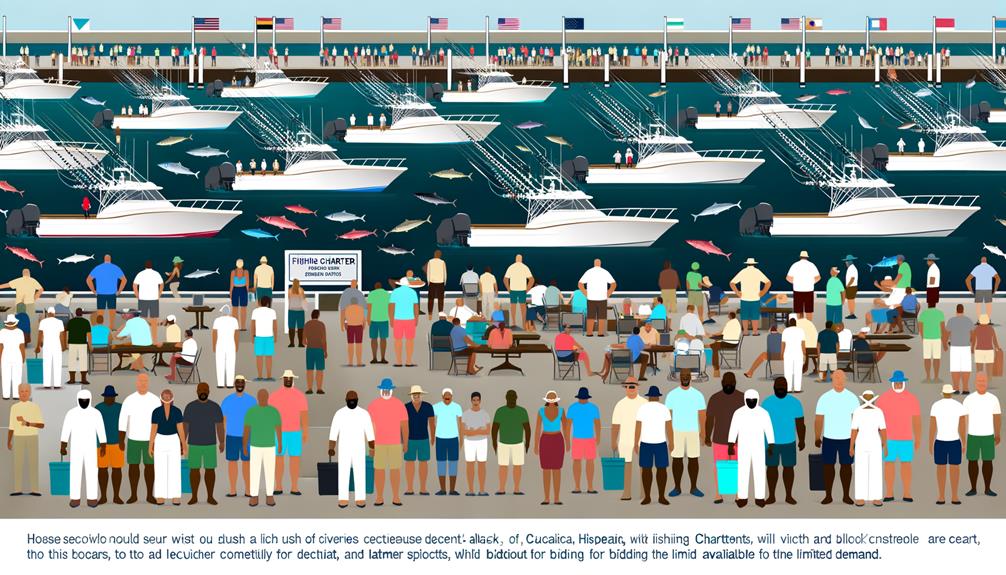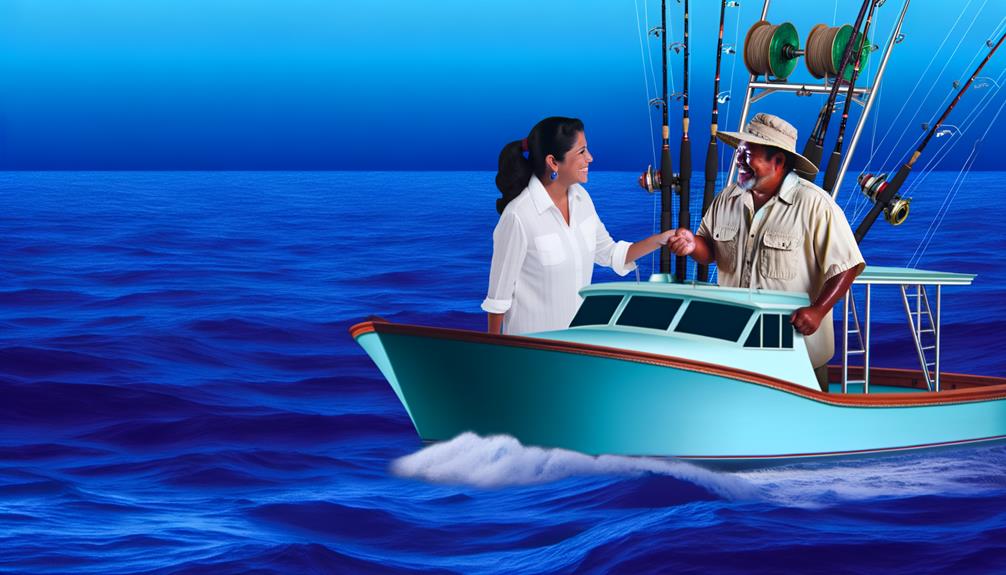Just as Hemingway’s Santiago battled the elements and his giant marlin, you too may feel a struggle when you look at the pricing of fishing charters. You might wonder, why are they so costly? The answer lies in a multitude of factors, from the boat’s maintenance to the crew’s expertise.
Then, there’s the unpredictable influence of market demand and geographic location. But before you cast aside the idea of chartering, consider the value of the unique experience it offers.
Stay with us; we’re about to navigate through the variable costs that shape the price of your fishing adventure.
Key Takeaways
- Factors such as crew’s experience, equipment upkeep, and boat maintenance contribute to the cost of fishing charters.
- Market demand and seasonal variations play a significant role in the pricing of fishing charters, with prices often spiking during peak seasons.
- Tipping fishermen is important as it supplements their low base wage and shows appreciation for their expertise and hard work.
- Fishing charters are expensive due to the quality of the vessel, the experience and knowledge of the crew, the potential for a successful catch, and the overall fishing experience provided.
Understanding Charter Boat Costs
When it comes to the cost of charter boats, you have to consider a multitude of factors such as the crew’s experience, equipment upkeep, the boat’s maintenance, and even geographic and seasonal nuances. Understanding charter boat costs isn’t just about the price tag you see; it’s about recognizing the total cost of providing a top-notch fishing experience.
The crew’s wages are a substantial part of the expenses. Hiring seasoned professionals who can navigate the waters skillfully and safely doesn’t come cheap. These experts also have an in-depth knowledge of where to find the best fishing spots, significantly enhancing your fishing trip.
Boat maintenance and equipment upkeep also add to the total cost. The price covers the fishing charter company’s cost of purchasing, maintaining, and operating the vessel, including fuel, dockage, and repairs. Specialized fishing gear, such as rods, reels, and baits, require regular servicing to ensure they last longer and perform optimally.
Lastly, don’t forget about seasonal and geographic influences. Popular fishing destinations and seasonal operations can cause charter boat costs to fluctuate. So, when planning your next fishing charter, remember to factor in all these aspects.
Crew and Expertise Value
Building on the topic of charter boat costs, let’s now focus on the significant role the crew’s expertise plays in the overall value of your fishing charter experience. The expertise and skills of the crew members augment the worth of your charter fishing trip, and here’s why:
- Your safety and successful navigation hinge on the crew’s years of experience. They’ve weathered countless storms and navigated tricky waters, so you’re in safe hands.
- Their comprehensive knowledge of the best fishing spots increases your chances of a great catch, making your trip more rewarding.
- The crew holds necessary licenses and certifications, ensuring legal and ethical practices are followed. This protects you from any legal consequences.
Their expertise, however, doesn’t come cheap. The cost of charter fishing reflects the value of their skills and knowledge. But remember, you’re not just paying for a boat ride, but an experience. An experience where you belong, one that’s enriched by professionals who know the ropes, literally and figuratively.
Market Demand Influence

You’ve probably noticed that fishing charter prices can spike during certain seasons – that’s market demand influence at work.
It’s a classic case of supply and demand dynamics; when more people want to charter, the cost goes up.
This is especially true during peak seasons when high demand factors into those hefty charter costs.
Supply and Demand Dynamics
Let’s delve into the supply and demand dynamics that greatly influence the cost of fishing charters. The ebb and flow of the fishing charter market can be a whirlpool of complexity, but it’s crucial to understand if you want to feel connected to this vibrant community.
- High demand for prime fishing locations and experienced guides often spikes charter costs. You’re not just paying for a boat ride, but a tailored fishing experience.
- Seasonal fluctuations in demand can significantly impact charter prices. High season in popular destinations like Florida or Alaska can see prices soar.
- The cost of running a charter business, from boat maintenance to crew wages, also plays a big part in the final price you pay. Remember, quality service doesn’t come cheap.
High Charter Costs Factors
Delving into the factors that ramp up charter costs, it’s clear that market demand significantly influences prices, particularly in popular fishing locales with seasonal variations.
High charter costs factors, such as geographic and seasonal demand, push up charters cost, especially in offshore charter hotspots like Florida or Alaska.
Fishing charter boats face stiff competition, which can further raise prices. Despite fluctuating fuel costs, charter pricing often remains steady, reflecting the customer’s perspective rather than that of the charter boat captain.
You’ll see higher demand during specific seasons, like Grouper season, which can impact profitability and, in turn, charter costs. But don’t forget, joining local forums and sharing expenses are ways to beat the cost.
Peak Season Pricing Impact
Now, consider the influence of peak seasons on market demand and how this affects the pricing of fishing charters. Just like any business, fishing charters are subjected to the laws of supply and demand.
Here are a few points to ponder:
- During peak fishing seasons, the demand for charters skyrockets, causing a significant peak season pricing impact. Popular destinations like Florida, Alaska, or Cabo San Lucas witness a surge in charter prices.
- The lure of open waters and the unique fishing opportunities during peak season push the demand further, making the charters more expensive.
- The per person cost increases as higher market demand drives up the prices of fishing charters.
Importance of Tipping Fishermen

You might wonder why tipping fishermen on a charter is so important.
To begin, you must understand that a fisherman’s income can heavily rely on these tips.
Thus, knowing the right tipping guidelines can make a significant difference in their livelihood and your fishing experience.
Understanding Fishermen’s Income
Let’s unravel the intricacies of a fisherman’s income, which surprisingly hinges significantly on the tips they receive. When you’re enjoying a day on a fishing charter, it’s essential to remember that the cost isn’t just about the experience. It’s also contributing to the livelihood of those who’ve guided you through it.
- Your tips directly supplement the fishermen’s income. They often depend on this extra cash to make ends meet because their base wage can be quite low.
- Tipping reflects your appreciation for their hard work. It’s a small gesture that makes a big difference.
- Remember, these guided fishing adventures wouldn’t be possible without their expertise.
Understanding this makes it clear why fishing charters may seem expensive. It’s about securing a sustainable livelihood for those who make the experience possible.
Guidelines for Tipping
Often, understanding the appropriate tipping etiquette on fishing charters can be a bit tricky, yet it’s crucial in ensuring these seasoned fishermen are adequately rewarded for their expertise and hard work. When you’re embarking on a fishing trip, remember, your captain and crew are providing you with a unique fishing experience that’s worth the money.
Here’s a simple guide to help you navigate this:
| Service | Suggested Tip |
|---|---|
| Exceptional service | 20% of the cost |
| Average service | 15% of the cost |
| Below average service | 10% of the cost |
Assessing Charter Worthiness
Understanding the worthiness of a fishing charter requires a keen evaluation of various factors. These factors include the quality of the vessel, experience and knowledge of the crew, and the potential catch. It is important to note that assessing charter worthiness is not solely based on price, but also on what the charter offers in terms of a unique and fulfilling fishing experience.
- Quality of the Vessel: The worth of a fishing charter is closely tied to the condition of its vessel. It is ideal to be on a boat that is safe, well-maintained, and equipped with the latest fishing gear and technologies.
- Crew’s Experience and Knowledge: The crew’s certifications to operate a fishing charter, their understanding of the local waters, and their ability to guide you towards a successful catch significantly determine the charter’s worth.
- Potential Catch: For avid anglers, the potential catch can be a big factor in assessing charter worthiness. A charter with access to abundant and varied fishing grounds can offer a more rewarding experience.
In essence, while NEW Fishing Charters may seem expensive, assessing charter worthiness goes beyond the surface. It is about ensuring that you get the best value for your money and an experience where you truly belong.
The Charter Fishing Experience

While you might initially be taken aback by the cost of fishing charters, it’s important to delve into the overall experience they offer, which includes invaluable guidance from seasoned guides, top-of-the-line equipment, and access to prime fishing locations. This isn’t just a fishing trip, but a full day offshore fishing adventure that can turn any novice into an avid angler.
Charter fishing allows you access to a wealth of fishing spots, from Singer Island to Sebastian. You’re not just paying for a boat ride, but for the expertise of the crew who knows exactly where the big catches are. Imagine the thrill as you reel in a variety of fish, guided by experts who can share a trick or two about their trade.
Moreover, charters use only the best equipment, ensuring that your line won’t break at the crucial moment. You’ll learn new techniques, gain insights, and create lasting memories. So, even if it seems pricey, remember that you’re not buying just a fishing trip. You’re investing in an experience, a unique journey that’s worth every penny.
Frequently Asked Questions
Why Do Fishing Charters Cost so Much?
You’re essentially covering high license fees, equipment maintenance, skilled labor wages, and fuel costs when you book a fishing charter. These factors combine to create the price, ensuring you a quality fishing experience.
Is Charter Fishing Worth the Money?
You’re investing in a unique experience with experienced guides, quality equipment, and hidden costs are covered. It’s more than just fishing, it’s learning, exploring, and bonding. So yes, charter fishing is worth the money.
Why Are Fishing Boats so Expensive?
Fishing boats aren’t just high-priced toys. You’re paying for boat maintenance, licensing costs, equipment investment, and fuel consumption. It’s not just a boat, it’s an investment in countless hours of peace and adventure.
How Much Profit Does a Fishing Charter Business Make?
You’re asking about fishing charter profits. It largely depends on business overheads, marketing strategies, licensing fees, and revenue diversification. It’s not a simple number, but a complex balance sheet of costs and income.
Conclusion
So, you see, charter fishing isn’t just about casting a line into the water. It’s a symphony of elements, from maintaining a sea-worthy vessel to ensuring top-notch equipment and a skilled crew.
Market demands and seasonal fluctuations play their role too. While the price tag may seem steep, remember, you’re paying for an experience, expertise, and the thrill of the catch.
Next time you reel in a big one, you’ll know it’s worth every penny.
